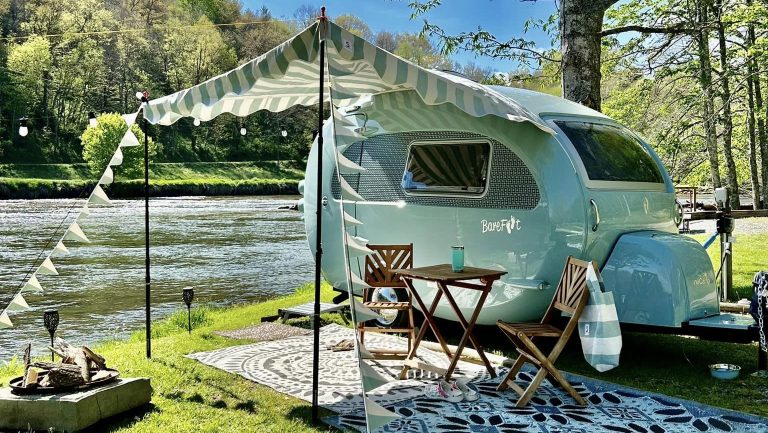Campers are a pretty friendly bunch. As a matter of fact, that’s one of the benefits of traveling via RV — meeting strangers who become friends and casual acquaintances who turn into great friends. It’s all about people from a variety of backgrounds who turn out to have a lot in common with you.
That being said, sometimes you have to draw the line and refuse access, even going as far as to show the intruder the door. No, we aren’t referring “human” gatecrashers, but rather those multi-legged or winged trespassers who sneak into your camper and make themselves at home.
Yes, we mean insects — ants and roaches, wasps and bees, mosquitoes and moths, and spiders, just to name a few. (We’ll discuss the rodent group in another post.) No matter where you travel or how clean you think your camper is, it’s a fact of nature that those darned bugs are going to find a way to get inside and once there, do their best to escape your watchful eye.
With that in mind, we pulled together tips and tricks from pest exterminators and experienced RVers on how to handle these unauthorized and unwanted guests when they arrive and what to do to discourage their return!
How to find them
Before you can get rid of the pests, you have to know where they are hiding. Here are some typical places where insects tend to hang out.
- Cracks or spaces between base moldings and walls, doors or windows and the surrounding frames, and ceiling fixtures and the ceiling
- Tears or small punctures in your window screens
- Small holes or gaps around pipes, water heaters, and vents where they enter your rig
In short, what may look like a teeny slit or a minuscule break to you is a huge open door to them!
Other tricks bugs have employed include climbing your trailer’s tires to gain access to parts of your rig or using a handy branch from a tree or shrub that is conveniently touching your camper’s body. Even you or your pet can be to blame. While the two of you have been out communing with nature, fleas, ticks, or other insects may have been hitchhiking a ride on your clothing or your pet’s fur, ready to take up residence when you return.
By the way, do you have a habit of leaving your sewage tank valves open? You might want to reconsider this practice, noted Debt-Free RV in this post, since sewage flies love it when you do that. It gives them access to the tank (the perfect spot to breed) and then they exit via your toilet to enter your living space. Enough said.
Conduct a bug patrol of your rig’s living space as well as the basement area to see what you find. Once you have figured out who’s hanging out, you’ll know what method to use.
How to eliminate them
Now that you’ve found them, what’s the best way to get rid of them? This is definitely a bug-dependent treatment plan. For example, if you have ants (more common at campgrounds than in the wild, according to this post by Boondocker’s Bible) you want to kill the nest, not just the ones you see scurrying around. While some RVers recommend soap spray or vacuuming them, others have used insecticide sprays or insect bait stations. The spray works on contact and inhibits their return, while the bait stations trick the ants and other small bugs into carrying the bait back home where it can wipe out the colony. Once the bugs are gone, wipe the area where they’ve been with a strong cleaner or a lemon juice or vinegar water solution to remove the pheromone trail, recommends Mobile RVing.
As for mosquitoes, one simple trick is to run a fan inside and out, since the air movement interrupts their flying ability. If you’re in a high skeeter area, you might want to spray the surrounding vegetation with an insecticide spray containing Bifenthrin, said Do-It-Yourself Pest Control. It not only has low toxicity but also helps reduce both flea and tick populations.
Is your problem out of control? You may have to call in an exterminator since rigs have so many cracks and crevices that the DIY approach may not work for a severe infestation. If you have a company you use for your bricks-and-sticks home, contact them to see if a service deal or price break is an option.
In any case, whether you do it on your own or call in the big guns, once the critters have been eliminated, do a thorough cleaning of every square inch of your rig, said RV Share. Launder all linens, wipe down or wash all upholstery, and vacuum carpets and soft surfaces. And don’t overlook inside the drawers and under appliances. If your HVAC registers are on the floor, remove the covers and clean the ducting as best as you can, recommends Harvest Hosts in this post. You might be surprised at the stuff that’s fallen in there!
Another tip comes from Always on Liberty: use a six-sided mattress encasement to keep the bugs out, then add a few silica gel desiccant packets between the mattress and encasement to help prevent any mold issues.
There are those who swear by essential oils to deter those pesky critters, but if you want to go the natural route, be aware that it’s not only bugs that can be bothered. People with allergies or sensitivity to certain fragrances can also be negatively affected, as can any pets, especially cats, that are traveling with you.
How to keep them from coming back
They came, you saw, and you conquered. But your job isn’t done since the insect grapevine has no doubt been active, telling other creepy crawlies that your camper is a good target. Follow these tips to keep your rig bug-free.
- Repair all those access points they used: the hole in the screen and the gap in the doorframe. Expanding foam insulation can help seal those spaces as well as where plumbing and wiring come up from the basement into your rig’s living area, said Changing Lanes RV.
- Keep dry foods in plastic containers with tight-fitting lids or sealed food storage bags, not in the bags they came in.
- Use plastic totes rather than cardboard boxes for storage. Not only does cardboard attract moisture, it also provides a hospital environment for the very critters you’re trying to eliminate, according to the Strategies Online Home Improvement blog. Spiders, silverfish, and roaches are among those who love the taste of a good box. Invest in plastic tubs, shoe boxes, and other containers with tight-fitting lids to reduce the food supply and new digs the bugs are looking for.
- Remind everyone to clean up after themselves: no open bag of chips left on the counter, no half-full bottle of soda on the nightstand, and no overflowing waste can in need of dumping.
- Don’t skip regular cleaning. Once a week, give your rig a good going-over — more if you’ve been traveling places where the bug population is high.
- Dispose of trash promptly and properly — preferably in a dumpster that isn’t next to your site.
- When you reach your destination, give it a good check before you settle in for the night. As Harvest Hosts noted, signs of ants or other bugs, or a location near wooded areas, wood piles, overgrown fields, or rundown buildings are all indications that you might get more than you want in terms of uninvited visitors.
- Practice good camper hygiene. Clean your shoes before coming inside, then stash them as close to the door as possible, preferably on a mat or boot tray. If you’ve been hiking in the great outdoors, check your clothing, body, and hair for anything you brought back with you. The same goes for your pet. Not only brush Fido’s fur but do a tick inspection, too.
In general, keep everything as clean as possible: Those few minutes spent tidying up your rig can help reduce hours hunting for unwelcome creepy crawlies!
Recent Articles





